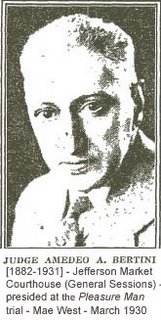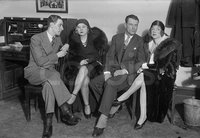Mae West: Judge
October in New York is an ideal time to highlight an Italian-American jurist who became a judge in October 1929, and who presided over an infamous obscenity trial at Jefferson Market Court (General Sessions) just a few months later — — a courtroom drama involving the actress-playwright MAE WEST.

• • • • Here's what The Herald Tribune reported on 4 April 1930:
• • • MAE WEST ACQUITTED! • • •
• • Who was Amedeo A. Bertini? And why did such a raucous raid in OCTOBER 1928 not go to trial until MARCH 1930?

• • Nathan Burkan, the high-profile lawyer hired to defend MAE WEST — — and keep the repeat offender out of Jefferson Market Jail — — did his best legal foot-dragging to stall the case from coming to trial. Meanwhile, the witnesses' memories were not as sharp after a year-long hiatus, and much of the cast had joined the Navy to avoid going to court.
• • Mae West, in mourning for her mother Matilda (who had died in January 1930) was often accompanied by Jim Timony, her brother Jack, and her sister Beverly.
• • Another supporter, the speakeasy queen Texas Guinan [1884-1933] was in court to cover the proceedings for the newspaper New York American. Texas was disappointed that Mae West did not take the stand. Nathan Burkan kept Mae out of the hot seat, arguing that she only penned the play - - but did not perform in it, obviously, since Mae was starring in her other play "Diamond Lil."
• • Meanwhile, Amedeo A. Bertini [1882-1931] was having his own headaches, dogged by accusations that he bought his way into the Supreme Court.
• • After a 1928 financial scandal had bumped Judge Francis X. Mancuso off the bench, in October 1929 a friend of Jimmy Walker (and also a pal of F.X. Mancuso) was nominated to take his place: Governor Roosevelt appointed Tammany-team-player Amedeo Bertini to the post.
• • Born in 1882 in Greenwich Village, Amedeo A. Bertini was the American son of two Italian immigrants who had left Northern Italy in 1873 and settled on the south side of Washington Square. His affable father Bartolomeo Bertini, the proprietor of the Campidiglio Hotel [135 Bleecker Street, near Thompson St.], became well-known in Italian-American circles; Mayor Hugh J. Grant appointed Bart Bertini to serve on the committee when New York City celebrated the 400th anniversary of Columbus in 1892.
• • His son Amedeo, a boyhood buddy of Jimmy Walker, attended P.S. 35 on 13th Street, DeWitt Clinton High School, and Cornell University. He transferred to Columbia University, where he received his bachelor's and his law degree. The lawfirm of Bertini and Hirshon was headquartered downtown in the Woolworth Building [233 Broadway, near City Hall]. Politically well-tooled, Bertini was a member of the Iroquois Club, Tiro a Segno, and the National Democratic Club. He had raised $75,000 for the Italian Hospital in N.Y.
• • In 1929, the position of a Supreme Court Justice paid $22,500. Before accepting the judgeship, however, Bertini had become wealthy. He and his family resided in a two-story penthouse on the roof of an apartment building he owned at 37 Washington Square West. Bertini's tenants included Charles L. Kohler, Tammany leader of the Tenth Assembly District.
• • Mae West's trial began 16 March 1930. It had its share of entertainment value. Cast member Chuck Connors II sang the controversial "She's the Queen of the Beaches" for Judge Bertini and the jury. Though somber and bereaved, Mae West had to stuff a black handkerchief in her mouth to keep from laughing at this performance.
• • Actor Alan Brooks [1888-1936] — — who played the title role in "Pleasure Man" — — swore on the witness stand that he was astonished to discover that his character had died from being castrated. The debonair 42-year-old leading man testified in smart-looking spats and a gorgeous suit.
• • Judge Amedeo Bertini dismissed the Wales Padlock Law as ineffective, saying that it was impossible to accurately stage a play with ambiguous meanings in front of the jurors. [No kidding. . . .] He warned Broadway producers to police themselves better, however.
• • Variety exulted with a banner headline: Mae West Beats It!
________________________________________________________________
Source:http://courtingmaewest.blogspot.com/atom.xml

Courting Mae West
Mae West
• • Photo: • • Mae West • • 1930 • •
NYC
Mae West.


• • • • Here's what The Herald Tribune reported on 4 April 1930:
• • • MAE WEST ACQUITTED! • • •
• • NEW YORK: The Jury drawn from a special panel to pass on Mae West's guilt for presenting "Pleasure Man," a play described by the state as "indecent, improper, immoral, and obscene," was dismissed by Judge Amedeo Bertini in General Sessions court today [4 April 1930]. The jury failed to agree on a verdict after 10 hours of deliberation. "Pleasure Man" was raided and closed on 1 October 1928, after one performance at the Biltmore Theatre on Broadway, and the case — — involving Mae West and eleven co-defendants of the cast — — has been pending since then. . . .
• • Who was Amedeo A. Bertini? And why did such a raucous raid in OCTOBER 1928 not go to trial until MARCH 1930?

• • Nathan Burkan, the high-profile lawyer hired to defend MAE WEST — — and keep the repeat offender out of Jefferson Market Jail — — did his best legal foot-dragging to stall the case from coming to trial. Meanwhile, the witnesses' memories were not as sharp after a year-long hiatus, and much of the cast had joined the Navy to avoid going to court.
• • Mae West, in mourning for her mother Matilda (who had died in January 1930) was often accompanied by Jim Timony, her brother Jack, and her sister Beverly.
• • Another supporter, the speakeasy queen Texas Guinan [1884-1933] was in court to cover the proceedings for the newspaper New York American. Texas was disappointed that Mae West did not take the stand. Nathan Burkan kept Mae out of the hot seat, arguing that she only penned the play - - but did not perform in it, obviously, since Mae was starring in her other play "Diamond Lil."
• • Meanwhile, Amedeo A. Bertini [1882-1931] was having his own headaches, dogged by accusations that he bought his way into the Supreme Court.
• • After a 1928 financial scandal had bumped Judge Francis X. Mancuso off the bench, in October 1929 a friend of Jimmy Walker (and also a pal of F.X. Mancuso) was nominated to take his place: Governor Roosevelt appointed Tammany-team-player Amedeo Bertini to the post.
• • Born in 1882 in Greenwich Village, Amedeo A. Bertini was the American son of two Italian immigrants who had left Northern Italy in 1873 and settled on the south side of Washington Square. His affable father Bartolomeo Bertini, the proprietor of the Campidiglio Hotel [135 Bleecker Street, near Thompson St.], became well-known in Italian-American circles; Mayor Hugh J. Grant appointed Bart Bertini to serve on the committee when New York City celebrated the 400th anniversary of Columbus in 1892.
• • His son Amedeo, a boyhood buddy of Jimmy Walker, attended P.S. 35 on 13th Street, DeWitt Clinton High School, and Cornell University. He transferred to Columbia University, where he received his bachelor's and his law degree. The lawfirm of Bertini and Hirshon was headquartered downtown in the Woolworth Building [233 Broadway, near City Hall]. Politically well-tooled, Bertini was a member of the Iroquois Club, Tiro a Segno, and the National Democratic Club. He had raised $75,000 for the Italian Hospital in N.Y.
• • In 1929, the position of a Supreme Court Justice paid $22,500. Before accepting the judgeship, however, Bertini had become wealthy. He and his family resided in a two-story penthouse on the roof of an apartment building he owned at 37 Washington Square West. Bertini's tenants included Charles L. Kohler, Tammany leader of the Tenth Assembly District.
• • Mae West's trial began 16 March 1930. It had its share of entertainment value. Cast member Chuck Connors II sang the controversial "She's the Queen of the Beaches" for Judge Bertini and the jury. Though somber and bereaved, Mae West had to stuff a black handkerchief in her mouth to keep from laughing at this performance.
• • Actor Alan Brooks [1888-1936] — — who played the title role in "Pleasure Man" — — swore on the witness stand that he was astonished to discover that his character had died from being castrated. The debonair 42-year-old leading man testified in smart-looking spats and a gorgeous suit.
• • Judge Amedeo Bertini dismissed the Wales Padlock Law as ineffective, saying that it was impossible to accurately stage a play with ambiguous meanings in front of the jurors. [No kidding. . . .] He warned Broadway producers to police themselves better, however.
• • Variety exulted with a banner headline: Mae West Beats It!
________________________________________________________________
Source:http://courtingmaewest.blogspot.com/atom.xml
Courting Mae West
Mae West
• • Photo: • • Mae West • • 1930 • •
NYC
Mae West.

Labels: 10007, 1930, Alan Brooks, Amedeo Bertini, Criminal Court, Mae West, New York, NY, Texas Guinan

1 Comments:
Great pic at top of mae wearing modern clothes
Post a Comment
<< Home